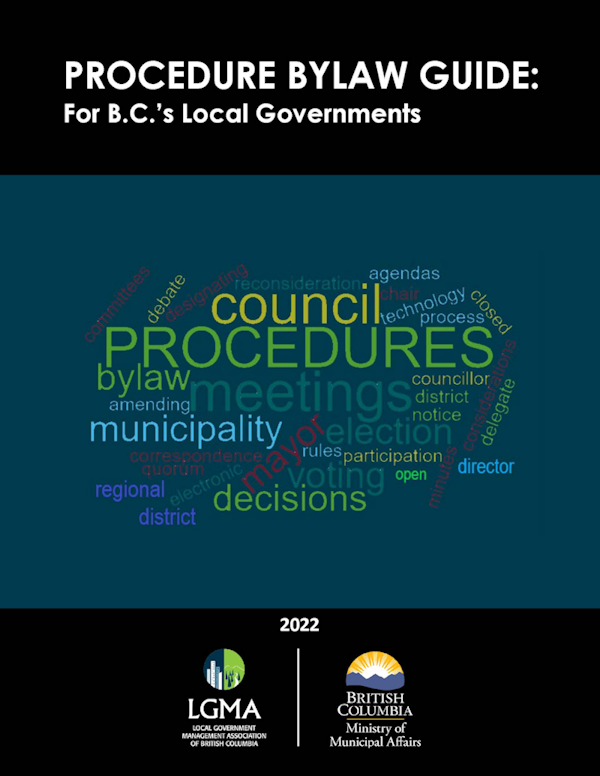Municipal procedure bylaw
Municipal councils must establish procedures for the conduct of their meetings and for the general conduct of their business. These procedures are contained in a procedure bylaw.
A municipal council must adopt a procedure bylaw to:
- Establish rules of procedure for council meetings, including how resolutions may be passed and bylaws adopted
- Establish rules of procedure for council committee meetings
- Provide for the taking and certifying of minutes at council and council committee meetings
- Provide for giving advance public notice of council and council committee meetings
- Identify places to post public notices issued by the municipality
- Establish the procedure for designating a council member as the acting mayor
- Identify a day, within the first ten days of November, for the first regular council meeting following a general local election
Council may include other matters in a procedure bylaw, provided they do not conflict with other procedures or requirements set out in the Community Charter, other legislation or otherwise established by law.
On this page:
- Public notice
- Robert's Rules of Order
- Commissions and other bodies
- Electronic meetings procedures
- Other procedures
Public notice
In keeping with principles of openness and accountability, council must not amend, repeal or replace its procedure bylaw without first giving public notice of the intended changes. The notice must describe the proposed changes in general terms and be posted in the municipality's public notice posting places (for example, the municipal hall) and published in accordance with section 94 of the Community Charter.
Robert's Rules of Order
Council may also use Robert's Rules of Order to conduct its meetings and make decisions as a group.
Robert's Rules of Order are different from the meeting procedure requirements in the procedure bylaw because these rules are not legislated but rather commonly agreed upon rules and customs for deliberation and debate.
For example, Robert's Rules of Order outline the order in which to conduct business (for example, call to order, roll call, reading of minutes) and the way to introduce a motion to the table and to put the motion to a vote. Using these rules encourages all council members to use the same language and participate in deliberation and debate in the same manner, which helps to keep meetings orderly and efficient.
Commissions and other bodies
When creating a commission or other body, municipal council may determine whether to apply existing council meeting procedures from the procedure bylaw, or to design specific procedures for those bodies.
The Community Charter requires that rules established by procedure bylaw for taking minutes at committee meetings apply to commissions and other bodies. However, beyond that, council may establish the procedural rules for commissions and other bodies that it chooses.
In most cases, applying existing council meeting procedures will be the simplest approach. There may be reasons for council to establish customized rules of procedure for commissions and other bodies, either within the procedure bylaw or in a separate bylaw, for example:
- In some communities there may be advantages to establishing rules for a staff member other than the municipal corporate officer to have overall responsibility for commission meeting minutes
- It may be appropriate to establish procedures that allow any member of council to participate in discussions and debates (but not vote) in a commission meeting
Electronic meetings procedures
If the procedure bylaw authorizes this, a municipal council may conduct regular, special or committee meetings electronically, and allow members to participate electronically in council and council committee meetings. In order to exercise these powers, councils would establish specific rules of procedure in its procedure bylaw and meet the requirements under the Community Charter.
Other procedures
Municipal council may choose to establish rules of procedure on any other matter it considers important, for example:
- Meeting management (for example, applying Robert's Rules of Order)
- Delegations appearing before council
- Practice of reading an invocation at the start of meetings (subject to Canadian Charter of Rights and Freedoms considerations)
- Expulsion of persons from a meeting (as authorized by the Community Charter)
- Seating arrangements at meetings
- Role of municipal officers and staff at meetings
- Dress codes
- Limitations on the rights of members during discussions and debates
- Time limits for the meeting
- Questions from the public and media
- Use of various recording media, including television and social media
- Civil discourse and appropriate language
- Making referrals and recommendations
- Reports from subsidiary bodies
- Receipt and discussion of new business
- Receipt and reporting of correspondence
Learn more about municipal procedure bylaws.
Related links
Contact information
Contact us if you have questions about municipal procedure bylaw.
250 387-4020
1 800 663-7867

